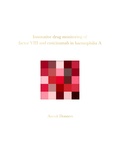Innovative drug monitoring of factor VIII and emicizumab in haemophilia A

Donners, Anouk
- Promoter:
- Prof.dr. A.C.G. (Toine) Egberts
- Co-promoter:
- Dr. C.M.A. (Carin) Rademaker
- Date:
- June 1, 2023
- Time:
- 12:15 h
Summary
People with haemophilia A (PwHA) have a deficiency of coagulation factor VIII and experience recurrent bleeding. Currently, PwHA are treated effectively with drugs such as FVIII products or emicizumab. Measuring and monitoring these drugs is important to determine the dose, which needs to be effective but not unnecessarily high due to costs (i.e., ~€100.000‒€400.000 per person per year). Mass-spectrometry (MS) is a beneficial technique to measure drug concentrations in blood and is used in clinical laboratories worldwide. Prior to this thesis, MS analysis was not used in haemophilia A care. This thesis aimed to optimize drug monitoring of FVIII and emicizumab in PwHA in three parts. Firstly, the development of MS methods measuring drugs similar to FVIII and emicizumab was summarized in a simple six-step workflow. Subsequently, two MS methods measuring FVIII and emicizumab were set-up and validated. Secondly, the studies on the concentration–biomarker relationship of FVIII yielded more questions than answers, while studies on literature and in our clinic indicated that emicizumab concentrations on standard dosing were often two-times above the minimal effective concentration. Thirdly, this thesis formed the groundwork for the design of a study protocol where the emicizumab dose is adjusted individually by targeting the minimum effective concentration. Finally, future perspectives were shared by giving four new applications of MS analysis quantifying FVIII and a framework for cost-efficient dosing strategies for other drugs similar to emicizumab.